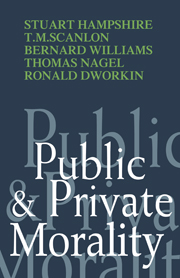2 - PUBLIC AND PRIVATE MORALITY
Published online by Cambridge University Press: 05 June 2012
Summary
In the Leslie Stephen lecture, re-printed as ‘Morality and Pessimism’, I used the phrase ‘rational computational morality’ in a pejorative sense, and I spoke of the ‘abstract cruelty in politics’ which had been associated in the U.S.A. during the Vietnam War with a new quasi-quantitative precision in the calculation of the consequences of alternative policies. These charges against a type of utilitarian thinking need fully argued support, and particularly the use of ‘rational’ here and of ‘abstract’ needs to be explained. Why should ‘rational’ be used in an abusive sense? It was perhaps evident that I was drawing on an Aristotelian idea of the form of rationality which is involved in practical reasoning. There is a presumed distinction between rationality in choosing between lines of conduct, practical reason, and rationality in arriving at true statements and beliefs, theoretical reason; and this distinction is associated with a specific account of practical reasoning. Within this account the word ‘abstract’, when applied to practical reasoning, becomes a reproach and for several distinct reasons. These reasons I shall set out as distinctly as I can. Even the word ‘rational’, as it occurs in the phrase ‘rational computational morality’, can be part of a reproach, because of the implication that the wrong model of rationality is involved: wrong, in the sense that it is inappropriate to practical reasoning, even if it is appropriate to reasoning of other kinds.
- Type
- Chapter
- Information
- Public and Private Morality , pp. 23 - 54Publisher: Cambridge University PressPrint publication year: 1978
- 27
- Cited by



